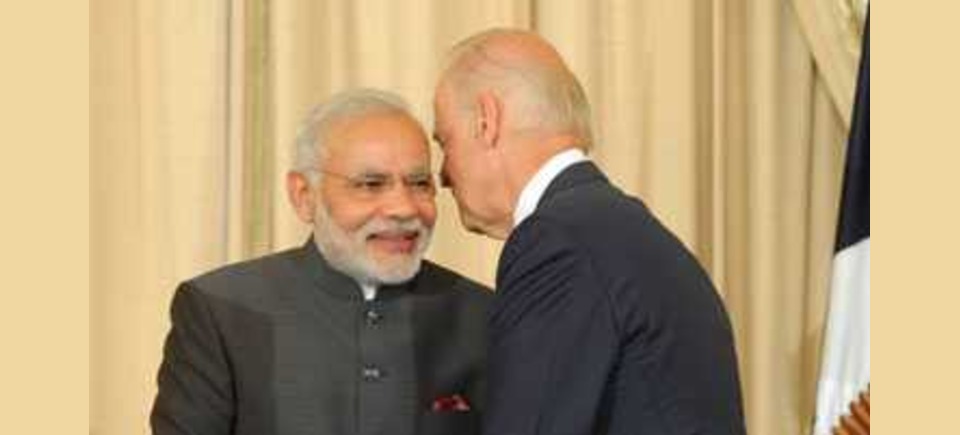By Mukesh Aghi
U.S. President Joe Biden completed a year in office in January. After four years of the Trump administration, the Biden administration has reset U.S. foreign priorities to more global engagement with a sense of multilateral diplomacy, as evinced with Build Back Better World (B3W) initiatives at G7, a focus on strengthening transatlantic ties, prioritization of the climate action initiatives by rejoining the Paris climate Accords and reprioritizing the Joint Comprehensive Plan of Action (JCPOA), to get Iran back to the negotiating table.
Furthermore, the elephant in the room has been trade, as Biden’s predecessor preferred a more transactional approach to trade, whereas Biden prefers a more collaborative multilateral approach to trade.
Trade:
Though trade between India and the United States has not quite reached the level of a Free-Trade Agreement, the needle has been moved more closely towards an early harvest deal. As Minister for Trade and Commerce Piyush Goyal spoke about at USISPF’s Fourth Annual Leadership Summit, he is eyeing an ambitious bilateral trade target of a trillion dollars between India and the United States by 2030. Currently, that number is $150 billion.
In the first year, we’ve already seen some successes, such as the maiden visit to New Delhi by U.S. Trade Representative (USTR) Katherine Tai and Deputy U.S. Trade Representative Sarah Bianchi, who met with Minister Goyal to re-launch the Trade Policy Forum (TPF) after a hiatus of four years.
The devil may be in the details, and there are still several outstanding market issues to sort through, but soon following the TPF, The U.S. Food and Drug Administration (U.S.FDA) approved the import of mangoes and pomegranates from India and secured New Delhi’s approval to supply of cherries, alfalfa hay, pork, and pork products to India.
With the U.S. as India’s largest trade partner, we strongly believe there is potential for increased trade resulting from continued dialogue, in-person meetings and additional trade agreements.
Bilateral Discussions
Though mobility in the era of the pandemic has been limited to a virtual world with the constant threat of new variants, both representatives from Washington to New Delhi have continued to have in-person bilateral discussions emphasizing the commitment.
The inaugural Quad summit presented the chance of a first meeting between President Biden and Prime Minister Modi in Washington. Both Secretary of StateTonyBlinkenand his counterpart Foreign Minister S. Jaishankar have met each other repeatedly to discuss challenges pertaining from mitigating the spread of Covid to managing the fallout resulting from the U.S. withdrawal from Afghanistan and the regional security challenges it continues to present.
Few threats are larger than the threat of Climate Change, and India and United States continued to engage to face this challenge as President Biden appointed a Washingtonian veteran in former Secretary of State, John Kerry to be the climate czar.Special Presidential Envoy for Climate, Kerry, visited India and along with Minister Bhupendra Yadav launched the U.S.-India Climate Action and Finance Mobilization Dialogue.Washington and New Delhi also coalesced on pressing Climate Action agenda at COP26.
The conventional security front has seen Defense Secretary Lloyd Austin meet his counterpart Defence Minister Rajnath Singh early in 2021, and the two will meet shortly for the 2+2 dialogue in Washington. Just a few months before his untimely passing, even the late Chief of Defence Staff, General Bipin Rawat, made a trip to Washington to discuss bilateral defense cooperation with his counterpart, Chairman of the Joint Chiefs of Staff Army Gen. Mark A. Milley.
A focus on the Indo-Pacific and Quad
Since Biden’s inauguration, we’ve observed an increased focus on the Indo-Pacific and specifically a commitment to increased cooperation under the Quad, driving a shared vision of a free and open and inclusive Indo-Pacific region. This week, Secretary of State Antony Blinken will participate in yet another Quad meeting during Biden’s presidency— this time in Melbourne, Australia—along with his counterparts, the foreign ministers from Australia, Japan, and India. The meeting will focus on synergy on vaccines, climate, new resilient supply chains and emerging technologies, while working to preclude assertive forces in the region.
I am confident that President Biden will honor India with an exemption from the Countering American Adversaries Through Sanctions Act (CAATSA), as the strategic relationship between the two is far too important, and sanctions would never have the intended consequences and instead be a reset of the relationship, a price too high to pay, given the focus on the Indo-Pacific.
Since Biden took office, the Quad countries have participated in a joint naval exercise last year, a foreign ministers’ meeting, a virtual meeting, an ambassadorial meet, an in-person Quad summit, in addition to the upcoming meeting next week.
The Quad countries have formed working groups on Covid-19 vaccination development to ensure developing countries have access to the vaccines, increased cooperation on technology and clean energy, all with the intention of promoting a free and open Indo-Pacific. After a virtual meeting in March 2021 and the first in person Quad Leaders’ Summit hosted by President Biden with the respective heads of state in September 2021.Looking ahead there will be a foreign minister’s meeting and an in-person heads of state summit expected later this year, in Japan, with new Prime Minister Fumio Kishida playing host, it’s clear that the Biden Administration is committed to ensuring that the Quad partnership is taken seriously in order to produce the cooperation necessary to build a stronger Indo-Pacific region.
Overall, the partnership has deepened during President Biden’s first year in office. We saw immediate support from the U.S. during India’s devastating second wave of Covid-19 in March 2021, and India has been quick to collaborate with the U.S. on vaccine production and medical supplies. The Quad has been reinvigorated, and bilateral trade has increased. Defense and security collaboration remains strong. With continued attention and investment of time and resources into this relationship, we believe it will only continue growing strong, having the potential to reach a new chapter of enduring success.
More information
https://www.financialexpress.com/world-news/bidens-one-year-presents-increased-engagement-with-india-in-trade-and-in-the-indo-pacific/2430461/


